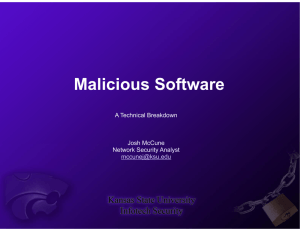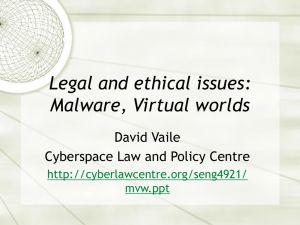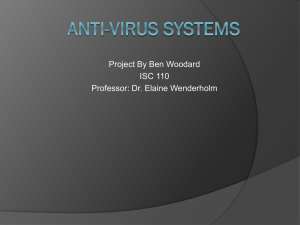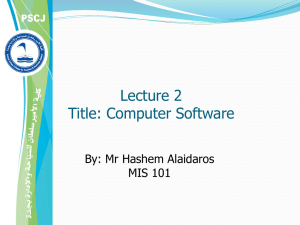1. Purpose
advertisement
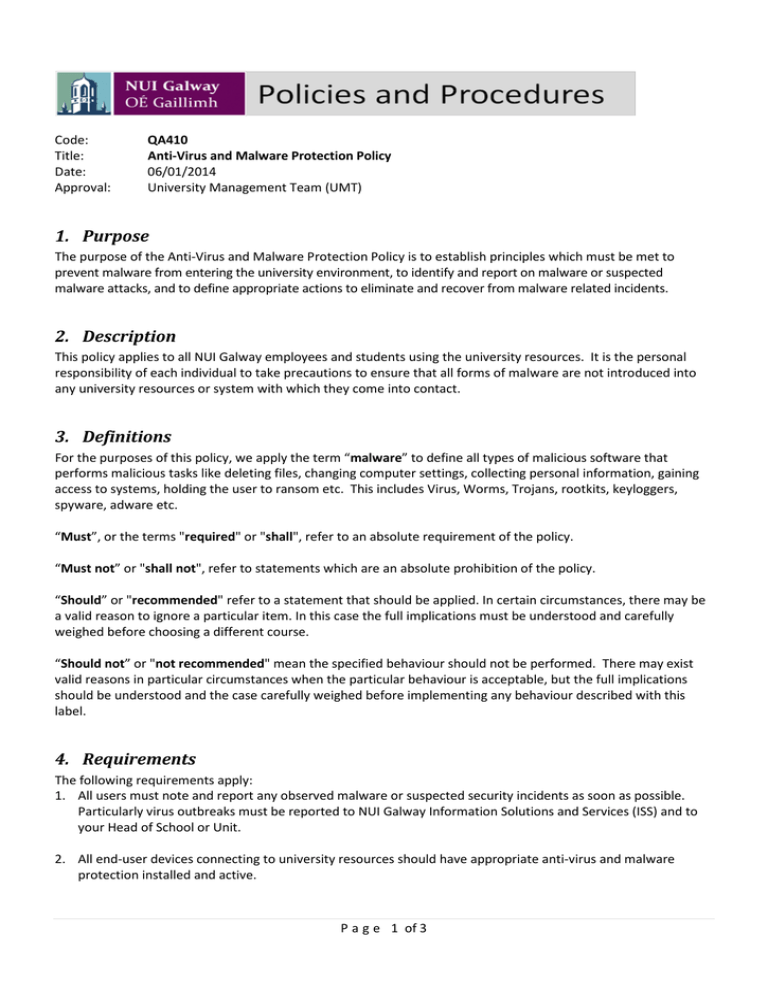
Code: Title: Date: Approval: QA410 Anti-Virus and Malware Protection Policy 06/01/2014 University Management Team (UMT) 1. Purpose The purpose of the Anti-Virus and Malware Protection Policy is to establish principles which must be met to prevent malware from entering the university environment, to identify and report on malware or suspected malware attacks, and to define appropriate actions to eliminate and recover from malware related incidents. 2. Description This policy applies to all NUI Galway employees and students using the university resources. It is the personal responsibility of each individual to take precautions to ensure that all forms of malware are not introduced into any university resources or system with which they come into contact. 3. Definitions For the purposes of this policy, we apply the term “malware” to define all types of malicious software that performs malicious tasks like deleting files, changing computer settings, collecting personal information, gaining access to systems, holding the user to ransom etc. This includes Virus, Worms, Trojans, rootkits, keyloggers, spyware, adware etc. “Must”, or the terms "required" or "shall", refer to an absolute requirement of the policy. “Must not” or "shall not", refer to statements which are an absolute prohibition of the policy. “Should” or "recommended" refer to a statement that should be applied. In certain circumstances, there may be a valid reason to ignore a particular item. In this case the full implications must be understood and carefully weighed before choosing a different course. “Should not” or "not recommended" mean the specified behaviour should not be performed. There may exist valid reasons in particular circumstances when the particular behaviour is acceptable, but the full implications should be understood and the case carefully weighed before implementing any behaviour described with this label. 4. Requirements The following requirements apply: 1. All users must note and report any observed malware or suspected security incidents as soon as possible. Particularly virus outbreaks must be reported to NUI Galway Information Solutions and Services (ISS) and to your Head of School or Unit. 2. All end-user devices connecting to university resources should have appropriate anti-virus and malware protection installed and active. P a g e 1 of 3 To protect against malware infections, an ‘in-depth defence’ strategy is required to minimise the risk of loss or damage to services. This includes anti-malware security controls at: • Client Protection • Network Perimeter • Server Level Client Protection 3. All PCs and laptop equipment must have anti-virus software installed and active. 4. All PCs and laptop equipment must have on-line (real-time) scanning enabled and enforced as a background service (i.e. each file access must be checked while loading). 5. All PCs and laptop equipment should have a minimum weekly scan of all files for malicious code. 6. All PCs and laptops must have automated update mechanisms enabled and active to ensure they are provisioned with the latest virus signature files Server Protection 7. All Microsoft based Servers must have anti-virus software installed and active. This includes: a. Real-time “on-access” scanning. b. Weekly scan for malicious code. 8. All anti-virus software must be configured to be updated automatically. The Virus Signatures should be updated (at a minimum): a. Daily for servers with network access to virus signature update server b. Weekly for other non-network connected servers 9. Due to the fundamental different approach used for security on UNIX based (UNIX & LINUX) system including UNIX file system security, User permissions, and executable not depending upon extension, it is not a requirement that UNIX systems have anti-malware installed and active. However, UNIX based systems are not bulletproof and can still suffer from malware and Trojans and it is therefore recommended that critical systems, or systems that perform a high level of interactivity with users should have anti-malware protection installed and active. 10. Servers with other operating systems than MS-Windows or UNIX are currently out of scope of this policy (e.g. Tru64/OpenVMS etc). In case such systems must be used, a case-based consultancy and evaluation must be carried out. Network Perimeter Protection 11. Approved anti-malware solutions must be deployed at all internet and e-mail gateways to prevent malware from entering the network. 12. Email checking for malware must be performed at the e-mail gateway for both incoming and outgoing messages. P a g e 2 of 3 5. Responsibilities Name ICT Security Committee Chair Director ISS University Management Team All End-users (refer to end-user policies) Internal and external audit ISS Service Desk Responsibility Policy Owner Revisions and updates to the policy Approval of the Policy Responsible for implementation of the policy. Monitoring and reporting compliance with the policy Tracking of calls related to Security Incidents 6. Related Documents QA411 End User Policy P a g e 3 of 3
